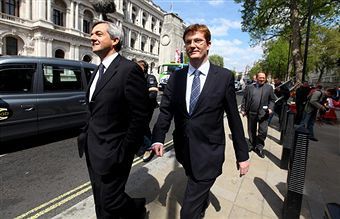 The most brutal session the Lib Dems will see is the studio audience currently assembled
The most brutal session the Lib Dems will see is the studio audience currently assembled
by Victoria Derbyshire for her Five Live phone-in. It’s a rare event in conference time, where the general public are put into contact with the politicians. The result is normally a bit of a
bear pit, and for that reason it’s become one of my favourite conference events – I’m in the audience, in the rather beautiful Liverpool Maritime Museum. And poor Danny Alexander is in
the bearpit. “This is toughest job I’ve ever had,” he said at the offset. Erm, yes – the competition being his time as press officer of the Cairngorms National Park and a press officer for the ‘yes to the Euro’ campaign. Now he’s overseeing a £650bn government
budget. So let the games begin.
“My question’s quite simple: how do you sleep at night?” This opener – from a trade unionist – set the tone. Alexander talks about how he “inherited a country”
(hardly) whose government spent £150bn more than it raises in taxes, so he has to cut. A member of Liverpool council says, “You’re sitting there talking about fairness, and
you’re stripping away £6 billion that we need to help vulnerable people. And that’s before God knows what you’re going to do next.” Jo Swinson, at 30 the youngest
LibDem MP, steps in: we need to control the debt. Derbyshire counters: “He’s just saying, don’t cut for the most vulnerable. It’s what you cut, not whether you cut. What
does the minister have to say?” No clear answer.
Next, a student: “Danny Alexander says he believes in work, so why does he support Tory plans to cut jobs?” Alexander replies that the private sector will create “more jobs
overall”. Derbyshire zooms in: “So, if that means thousands of public sector people on the dole queue, so be it?” He waffles, and the room turns on him. “Answer!
Answer!” She asks again. More shouting. At the end, Alexander says: “Yes, people will lose their jobs but the employment picture will be better overall.” Not that he was heard
much above the din. Alexander was struggling. They have not prepared for this properly in the Treasury. The appearance of evasion is damaging enough. This government still struggles to articulate
its growth strategy, why they are cutting, and why fiscal consolidation will make people better off. In these rare events where ministers face questions from the public (as opposed to Labour) their
lack of preparedness shows.
“At least now we now know that LibDems think unemployment is a price worth paying,” says the next audience member. “Robert Peston, something of a deity with you guys, says
40 percent of jobs in Liverpool are public sector. If you cut them, you’ll have more dole – and that will be more expensive.” Given that 27 percent of Liverpool are on out-of-work
benefits (data here) it does give you an idea of the smallish size of the private sector.
Alexander, to his credit, responds solidly on this point. He talks about a “regional growth fund… we should not be so pessimistic about the opportunity for the private sector to
grow.” He heads for the exit, and is replaced by Chris Huhne.
The questions get even more ferocious. “We remember in this city what Thatcher did, and we will not let you destroy us, our jobs or our services. We’ll fight for them. You need to look
at the social consequences of what you’re doing. You sound like Thatcher saying ‘there is no alternative’. There is an alternative.” She says that Britain had a deficit of
100 percent of GDP between 1920 and 1940 and used it to build the NHS. This, she says, is the alternative. It is also utter fiction.
Chris Huhne said the deficit has never been bigger than its current 12 percent in peacetime history. She obviously meant national debt – and (as Huhe didn’t say) the only triggers of it
rising in history have been war and Gordon Bown. As the below table shows:

Chris Huhne calms down the room, mainly because he’s do damn boring. It’s quite a skill, actually. Sitting here for a few minutes, you get the idea that Huhne could stop a riot by
giving a speech. At the break, everyone heads for coffee. Huhne heads for the door, job done.







Comments